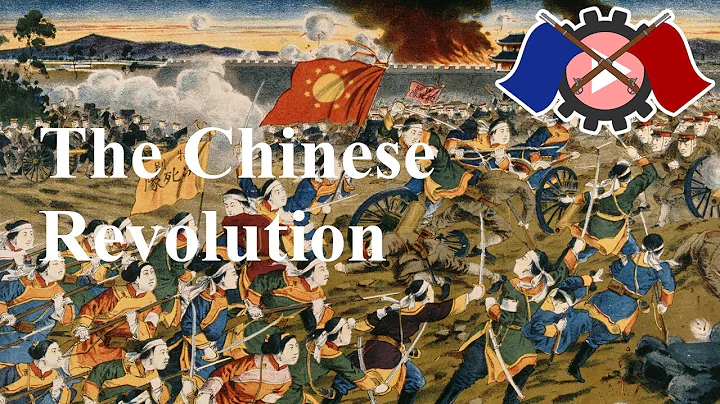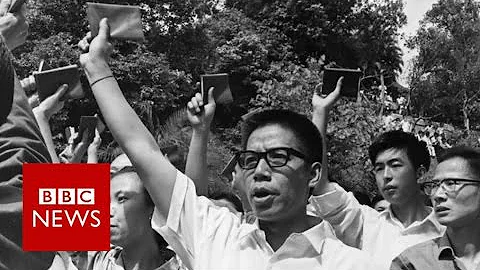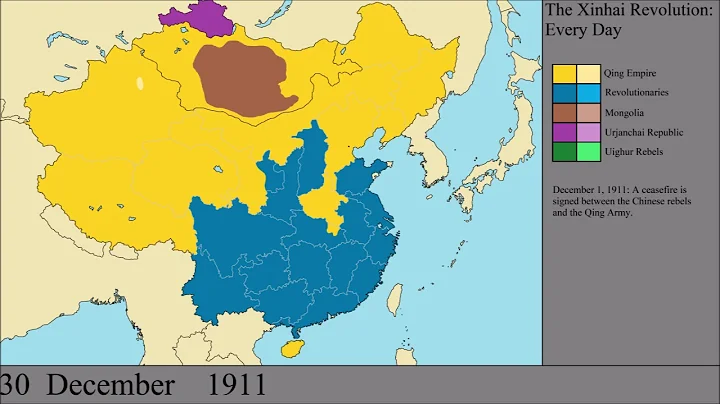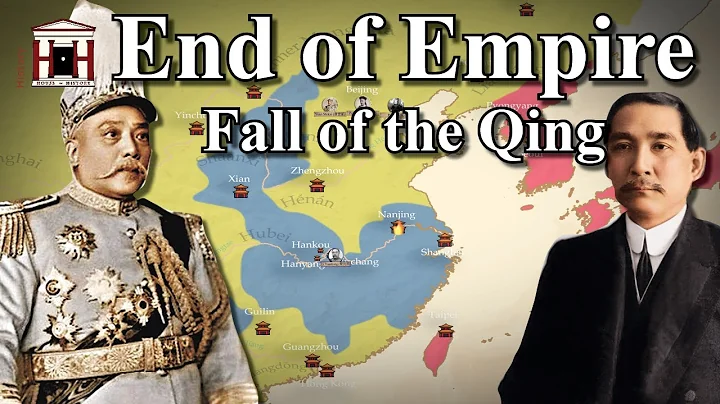
Wuchang Uprising
On October 10, 1911, the revolutionaries launched an uprising in Wuchang and fired the first shot of the Xinhai Revolution.
Two days later, the imperial court appointed Minister of War Yinchang to lead the First Army of the Beiyang Army to the south quickly. After the army arrived in Xiaogan, Hubei, Yinchang ordered an attack on Hankou. However, the officers and soldiers did not obey the order and hesitated.
They claimed: If they want them to go to battle desperately, Yuan Shikai must come out.
The Beiyang Army was created by Yuan Shikai. With his behind-the-scenes intervention, Yinchang could not control this tiger and wolf army even with the appointment documents from the court. Therefore, the regent Zaifeng had to appoint Yuan Shikai as the governor of Huguang and let him command the Beiyang army to quell the rebellion. However, Yuan Shikai felt that his official rank was too low, and he constantly refused to take orders on the grounds that his legs and feet were sick and he had difficulty moving.

Yuan Shikai
On October 22, Hunan and Shaanxi announced their independence from Qing rule.
Subsequently, uprisings occurred in Jiujiang, Jiangxi, Tengyue, Yunnan, Taiyuan, Shanxi and other places. On the 29th, Shanxi Province declared independence. On the same day, a mutiny broke out in Luanzhou, Zhili. The rebels pointed their finger at the capital. The world was in chaos. No matter whether the Qing government was willing to use Yuan Shikai or not, Yuan Shikai was already the only person to put down the rebellion.
On November 1, Yuan Shikai was appointed as Prime Minister of the Cabinet, taking charge of the Qing Dynasty military and political affairs. At the same time, all his other demands were met by the Qing court, and the conditions were negotiated. At this moment, Yuan Shikai was like a "devil king" who had been released from the seal, and the "Game of Thrones" officially began.
After putting on his court uniform again, Yuan Shikai did not go to the palace to express his gratitude, but went directly to the front line to supervise the battle, which greatly shocked the reputation of the entire Beiyang Army. His old subordinate Feng Guozhang replaced Yinchang to lead the First Army. He recaptured Hankou within a day, then captured Hanyang and advanced to Wuchang, with the potential to defeat the revolutionary army in one fell swoop.
At this moment, Yuan Shikai removed him and replaced him with Zhuhe's Duan Qirui. So under Wuchang City, the sound of artillery stopped.

Duan Qirui
Yuan Shikai knew very well that although from a local perspective in Hubei, the revolutionary army was no match for Beiyang , but 14 provinces across the country had already separated from the imperial court one after another. If the revolution succeeds, he will not end well.
On the other hand, if the revolutionary party is easily wiped out, the court will no longer need to keep him in the future, and the result will definitely be that the birds will be hidden and the dogs will be cooked. Therefore, Yuan Shikai decided to return to Beijing to consolidate his position and at the same time "enhance the enemy's self-esteem."
On November 13, Yuan Shikai led a large number of guards to the capital in a mighty manner, gathered his cronies and appointed them as ministers, and formed a responsible cabinet within three days. Then, Yuan Shikai began to attack the Imperial Guards in order to further control the Qing court.
The Zaitao who was in charge of the Imperial Guard at that time was the younger brother of the Regent Zaifeng and the uncle of Puyi. In order to transfer Zaitao, Yuan Shikai suggested to the court that royal ministers should go south to set an example for all armies and boost their morale. . When Zai Tao saw that Yuan Shikai was not interested in drinking, he was so frightened that he asked to be relieved of his military duties. Soon after, Yuan Shikai transferred Feng Guozhang to the capital to take over the Imperial Guard, firmly holding the heart of the dynasty.

On the other side, Yuan Shikai also secretly communicated with the revolutionary party through various channels.
For example, on the evening of November 27, he hosted a banquet at home for a member of the Alliance , and arranged for his eldest son Yuan Keding to become a brother with a different surname. This person is " Wang Jingwei " who was once famous for assassinating the regent and was recently released from prison.
With Wang's secret communication, Yuan Shikai naturally knew the movements of the Southern Revolutionary Party clearly.
doesn’t want to use weapons, but he can’t do nothing. Therefore, Yuan Shikai appointed Tang Shaoyi as the plenipotentiary representative of the Qing court to initiate north-south peace talks. This negotiation affects the interests of all parties. Needless to say, the Qing Dynasty and the Revolutionary Party, even the imperialist powers are always paying attention to the situation. For their own interests in China, they do not want a large-scale civil war to break out in China, so they support Yuan Shikai unified the north and the south.
The British government directly stated: "China should form a provisional government with Yuan Shikai."
Yuan Shikai also responded: "Once Tang Shaoyi's negotiations are ineffective, as a last resort, we have to resort to mediation from various countries."
This kind of mediation is not just words. It's just words, but intervention by force. As of mid-November, 51 foreign warships have invaded China's territorial waters, forming a posture of armed intervention.

In December 1911, the peace talks were held in Shanghai as scheduled. The North and the South negotiated various major issues related to China's future. The Revolutionary Party demanded that the North first express its support for the democratic republic, while Tang Shaoyi, under the instruction of Yuan Shikai, insisted on retaining the monarchy. When the peace talks reached a deadlock, .
At this time, Yuan Shikai's young teacher and big industrialist Zhang Jian came forward. He introduced Tang Shaoyi to a leader of the Tongmenghui - Huang Xing, and let them talk alone.
Huang Xing is the number two figure in the Tongmenghui. Although he thinks that Yuan Shikai is a treacherous and cunning man with no loyalty at all, Yuan Shikai's strength is obvious. If he is allowed to be president, his term will only be a few years. Years, the people can suffer less from the war. And if we become an enemy of him, we might not even be able to preserve the current revolutionary achievements.
Huang Xing's ideas actually represented the attitudes of many revolutionaries at the time. He and Tang Shaoyi conducted many secret negotiations. After the two parties reached an agreement, Zhang Jian immediately sent a secret message to Yuan Shikai: "As long as the Manchurian Emperor You abdicated the throne on the first day, and everyone supported you as president the next day."

Huang Xing
Everything was going smoothly, but then a new situation emerged, which shocked Yuan Shikai——Sun Wen returned from overseas. .
Sun Wen, also known as Sun Yat-sen, was the Prime Minister of the Tongmenghui. He had been working hard to overthrow the Qing government since 1894. He was recognized as a pioneer of China's democratic revolution, and his prestige at that time was unparalleled.
On December 25, 1911, he returned from the United States. Four days later, he won 16 votes at the 17-province representative meeting and was elected as the interim president of the Republic of China. On the second day of the election, in order to honor the peace agreement between the north and the south, Sun Yat-sen specially called Yuan Shikai to express that he was only temporarily in office and would definitely give up his position in the future.
Despite this, Yuan Shikai still believed that the Revolutionary Party had not kept its promises. He directly rejected the results of the North-South peace talks on the grounds that "the conference treaties were not discussed with this minister first" . At the same time, he instigated Feng Guozhang and other 48 Beiyang generals to jointly send a telegram to the whole country, claiming: "Swear not to recognize the republican system and will not hesitate to fight against each other."

Sun Yat-sen
In order to dispel Yuan's doubts, Sun Yat-sen sent another telegram, this time almost to the sky. The oath was made sincerely, and Sun Yat-sen said in the telegram: "Wen Cheng was elected by all provinces, and the oaths are all there. I only have this intention, and I will learn from it every day. If you use the article as a way to lure the enemy, it will be a misunderstanding."
After reading this letter, After receiving the telegram, Yuan Shikai felt relieved and decided to force the Qing emperor to abdicate the next day.
As the saying goes, there are three nails in a broken ship. If they were directly forced into the palace, the Manchu nobles would definitely struggle to the death. It would not be difficult to resolve their struggles, but what would be difficult would be issues of legality and reputation. So things had to be done, but Yuan Shikai didn't want to be accused of rebelling and usurping the throne.
On January 16, 1912, it was freezing cold in the capital, and Yuan Shikai took a carriage home from the palace. When walking to Donghuamen Street, someone suddenly dropped three bombs from the restaurant upstairs. Yuan Shikai's guard leader, a platoon leader, two soldiers, and two civilians were all killed on the spot, and two horses were also killed. The explosion injured his stomach. After being frightened, he ran away. Mafra couldn't hold him back. He didn't stop until he reached the gate of the Ministry of Foreign Affairs office. He soon bled to death.
At the same time, Yuan Shikai in the carriage was safe and sound. After returning home, he briefly explained the situation to his family and immediately laughed.
After the incident, the military and police quickly mobilized and captured 10 assassins, most of whom were members of the Tongmenghui. They were dissatisfied with the compromise strategy of the Southern Revolutionary Party and had to get rid of Yuan Shikai.

Although this assassination operation failed to achieve its goal, it helped Yuan Shikai. Prior to this, Yuan Shikai had fabricated rumors saying: "Revolutionaries have spread all over Beijing." At that time, the Manchu nobles were still doubtful. But now it turns out that not only was Mr. Yuan not lying, but he was also a loyal minister, which is why he caused chaos. Party assassination. After the assassination of
, Yuan Shikai just had an excuse to claim that he was ill and could not go to court. He did not have to or did not want to personally come forward for the next thing. The "dirty work" would naturally be done by his younger brother.
On January 22, 1912, Duan Qirui, the general of the Beiyang Army, began to set the pace. He called the Qing cabinet and said: "I have heard about republican ideas. Recently, the generals are quite aggressive." The vernacular is: "No more. When a republic is implemented, the generals will not be able to control themselves."
Four days later, he led 50 generals in a joint call. The Qing government had no choice but to comfort him.
February 4th, Duan Qirui and others continued to attack, this time saying more bluntly: "I would like to lead all the soldiers to Beijing to discuss our interests with the prince." means: "If you don't listen to good words, then let's Guns and guns will teach you a lesson."
The Manchu nobles were completely paralyzed by fear. At this point, they could only lie down.

Abdication Edict
On February 12, 1912, Empress Dowager Longyu issued an edict announcing Puyi's abdication, and recited the edict in public: "The will of the people is known, and the destiny of the people is known. How can we bear to honor the people with the honor of one surname?" "
That day was the last time the Qing Dynasty retired from the throne. It was not only the Empress Dowager Longyu and the six-year-old Puyi who stood up from the dragon throne, but also the ghosts of 421 emperors. The tyrannical Emperor Yang of the Sui Dynasty stood up and fell down again. Heavenly Khan Li Shimin, Emperor Kangxi, the ancestor of the Qing Dynasty, and even Guangxu, who hated Yuan Shikai to the bone, all turned into sighs and drifted away without a trace.
From then on, the emperor "died", dead forever.
completed the end of China's two thousand years of feudal monarchy in an almost bloodless manner. This is of course a major event that promotes the historical process. From an objective fact perspective, Yuan Shikai has made contributions, but democratic republic is not his original intention. In the final analysis, what he cares about is the promise made to him by the revolutionary party - Three days after the Qing emperor abdicated, Nanjing The Senate kept its promise and elected Yuan Shikai as interim president.
But Yuan Shikai knew very well that he was not the official president yet. This game of thrones had actually just reached the midfield, and it was time to show off his acting skills. He promised Nanjing in the telegram:
"From now on, we will work hard to achieve a perfect status and never allow the monarchy to return to China."

The Revolutionary Party proposed that the provisional government should be located in Nanjing. Yuan Shikai must go south to take office. The revolutionary party specially sent a special envoy to Beijing to greet him. But Lao Yuan understood that once he went to Nanjing, he would be leaving his base camp, and he would be restricted in what he could do if he was surrounded by the revolutionary party. But if you refuse directly, I'm afraid you will break up.
So, on the night when the southern mission arrived in Beijing, he secretly ordered his subordinate Cao Kun to launch a mutiny in the name of asking for military pay. When gunfire broke out, he told the envoy: It was not that he was unwilling to go south, but that the Beijing Taipei was unwilling to go south. Chaos, he must stay to stabilize the situation. The revolutionaries had no choice but to obey.
On August 24, 1912, regardless of his personal safety, Mr. Sun Yat-sen came to Beijing at the invitation of Yuan Shikai to discuss the reunification of the North and the South. Lao Yuan warmly welcomed him, dispatched his own double carriage with gold lacquer and red wheels, and ordered the Beijing military police to greet him with presidential courtesy.
That evening, a welcome banquet was held for Mr. Sun Yat-sen at the Presidential Palace in Iron Lion Alley. The two interim presidents of the Republic of China toasted to each other and had a pleasant conversation. After the banquet, Yuan Shikai lamented to reporters: “It’s so late to meet Mr. Zhongshan." Mr. Zhongshan also publicly said: "President Yuan has no intention of being disloyal to the Republic of China, and the people must not be suspicious of President Yuan. "
During Mr. Sun Yat-sen's stay in Beijing, the two talked for 13 times.

Tang Shaoyi (left) and Sun Yat-sen (right)
So far, whether out of justice or selfishness, using conspiracy or conspiracy, Yuan Shikai has come to the end of his life. At the peak of his hegemony, he could take advantage of the situation and serve as the official president for a few more years. In the eyes of 40 million people, he ended the monarchy with his own hands, and joined hands with Mr. Sun Yat-sen to lead China to republic. His position has no one to replace him.
However, Zhiren. Knowing the face but not knowing the heart is just like Bai Juyi said in : "The Duke of Zhou is afraid of the day of rumors, Wang Mang is humble and has not usurped it. Xiangshi died at the beginning, and who knows the authenticity of his life. " But there are no ifs in history. Yuan Shikai's character, mind and courage have long been determined. The will to power drives him to the top, and it also drives him to madness. The turning point that accelerated his madness came from a murder case and a corpse.
1913 3 On the evening of March 20, Song Jiaoren set off from the Shanghai Railway Station to Beijing. Suddenly, a gunshot was fired in the night. Song Jiaoren was shot in the right waist and died on the spot two days later. He was only 32 years old.
Song Jiaoren's death shocked the whole country. Mr. Zhongshan was visiting Japan at the time. After receiving the news, he immediately called the Kuomintang people and demanded a thorough investigation of the truth. Under the pressure of Huang Xing and others, the Shanghai police succeeded in only three or four days. The assassin was named Samurai Ying. The instigator is currently inconclusive. Some say it is Prime Minister Zhao Bingjun, while others say it is Yuan Shikai himself.

Song Jiaoren
Although Yuan Shikai strongly denied it, this incident has aroused national outrage. , "Guofeng Daily", "Republic of China", "Minlibao" and other newspapers published anti-Yuan articles, angrily accusing Yuan Shikai's government of conspiracy, assassination, and betrayal.
The death of Song Jiaoren became a trigger for Yuan Shikai. The heroic persona created by his acting skills finally collapsed, and knowing that there was no point in arguing, he simply broke out and sent troops southward.
In the south, Mr. Zhongshan decided to raise troops to attack Yuan.
html On July 15, Huang Xing forced. The Governor of Jiangsu declared independence and appointed himself the commander-in-chief of the Jiangsu Army against Yuan. Since then, Anhui, Guangdong, Fujian, Hunan, Sichuan, Shanghai and other places have responded. However, the Beiyang Army has been operating for many years and is indeed powerful. In less than two months, the "Second Army" will be defeated. "The Second Revolution" was suppressed, and Mr. Sun Yat-sen and other Kuomintang leaders were forced to go into exile overseas. The second revolution ended in failure.On October 10, 1913, in the Hall of Supreme Harmony in the Forbidden City where the emperor of the Qing Dynasty ascended the throne, Yuan Shikai held an inauguration ceremony and became the first president of the Republic of China. A formal president.
html On November 4, he ordered the Beijing branch of the Kuomintang to be surrounded, seized the certificates and badges of the Kuomintang members overnight, and expelled 438 people from the Congress. At the beginning of the next year, he simply dissolved the Congress. Provisional Convention " was thrown into the trash, and people were sent to concoct the "Convention Law of the Republic of China" and the "Amended Presidential Election Law"
In 1915, representatives of China and Japan signed the "Twenty-One Laws"
In January 1915, the Japanese government. Proposed the "Twenty-One" and threatened Yuan Shikai that if he refused to sign, Japan would support the revolutionary movement in China. Although Yuan Shikai had dealt with Japan, in order to retain his position as president, he finally signed the " The Four Civil Treaties between China and Japan" caused 40 million people to suffer great shame and humiliation.
In August of the same year, Yuan Shikai's confidant Yang Du, Liu Shipei, Yan Fu and other six people formed a preparatory committee to publicly call for the restoration of the monarchy and cheer for Yuan Shikai. The next month, Yuan Shikai's godson Duan Zhigui and the generals of the 14 provinces sent a secret message urging him to ascend to the throne as soon as possible.
There was also some minor turmoil within the Yuan family. The eldest son Yuan Keding encouraged his father to proclaim himself emperor so that he could become the prince in the future. Knowing that Yuan loved to read the "Sunchon Times", he found a group of people to print a copycat version with the same date, but the public opinion displayed was very different. The above insinuations basically only said one thing: "The restoration of the monarchy is the general trend and the people's support." direction."
After the incident lasted for a while, the matter was finally exposed. Yuan Shikai took a whip and beat Yuan Keding violently. While beating him, he scolded him for bullying his father and harming the country. Yuan Shikai's beating and scolding was not nothing but a show. His son's behavior was indeed a deception. But it was so comfortable to flatter him

On December 12, 1915, after several hypocritical concessions, Yuan Shikai finally "reluctantly" listened to his ministers' advice and accepted the throne, and ordered that the title be changed to "" in 1916. In the first year of "Hongxian ", the Presidential Palace was renamed Xinhua Palace and a constitutional monarchy was implemented.
A few days later, Yuan Shikai, wearing the uniform of a generalissimo, accepted the homage of ministers at the enthronement ceremony in Jurentang, Zhongnanhai, and finally became his emperor. Dream.
Yuan Shikai spent a lot of money for this ceremony. All the money combined was about 30 million silver dollars, which was enough to buy 10 Hai Rong class cruisers
of the Beiyang Navy at that time. The Qing Dynasty Navy purchased three protected cruisers from Germany after the First Sino-Japanese War. There were three ships of the same class, Hai Rong, Hai Chou, and Hai Chen. The three ships were built by the German Vulcan Shipyard, with a cost of 163,000 each. Thousand pounds, the three ships arrived in Dagu respectively in 1898, and were accepted by Yulu, the governor of Zhili.)
At that time, the Beiyang government treasury debt was more than 20 million, so where did this huge sum of money come from?
In fact, there are three channels, one is foreign loans; the other is depositors' deposits; the third is opium trafficking. From opium trafficking alone, Yuan Shikai earned nearly 27 million.
How did Yuan Shikai spend it?
The 30 million yuan is mainly used for two purposes. One is to use 20 million yuan for the coronation ceremony. The other is to use 10 million yuan to reward the army after becoming emperor. We focus on the 20 million yuan.

According to the bill record, 20 million yuan is used. Some of them bribed celebrities to influence people's hearts; some of them bribed newspapers to speak favorably for Yuan through the news. Since he is an emperor, he must have an imperial style, and the coronation ceremony cost a huge amount of money.
Two dragon robes were completed. Weaved with gold wire and embedded with jewels, it cost 1.8 million yuan; two crowns cost 100,000 yuan; one jade seal, worth 300,000 yuan; a dragon chair cost 400,000 yuan; two pairs of shoes filled with pearls, It also costs 20,000 yuan. As for the miscellaneous expenses of the ceremony, in order to show the grandeur of proclaiming the emperor, Yuan Shikai was even willing to spend money. Even the badges worn by the guests were made of pure gold, and each person was given a set of "10,000 yuan commemorative silver coins." Yuan Shikai spent a total of 2 million yuan on his wives, concubines, and concubines, and Prince Yuan Keding spent 100,000 yuan on clothing and clothing.
However, the law of nature is clear and justice is in the hearts of the people. No matter how much Yuan Shikai spent money and whitewashed peace, he never understood one thing until his death: "History is created by the people" , going against the trend of history and going against the will of the people, A regime without the support of the people will ultimately be short-lived and a castle in the air.
On March 22, 1916, the farce of proclaiming emperor ended absurdly. Amid nationwide opposition, the helpless Yuan Shikai announced the abolition of the "Hongxian" reign title. After failing to become emperor, Yuan Shikai planned to return and become president. However, the situation no longer allowed it, and Yuan's thieves were killed everywhere. On June 6, 1916, Yuan Shikai's life came to an end amid worry, fear, and depression.

He is dead and will have endless troubles. Because of Yuan Shikai's selfish desires, he did not serve the country but only benefited himself. After his death, he left behind a chaotic world in Beiyang where warlords fought and fell apart. Yuan Shikai's feudal attributes destined him to go crazy and choose restoration, so his downfall is a historical necessity.
In July 1912, Lenin once wrote an article "Democracy and Populism in China", which profoundly summarized Yuan Shikai's life, saying that he was the best at rebelliousness. Yesterday, he was afraid of the emperor and crawled in front of him. Later he saw the revolution. The power felt that the revolutionary democrats were about to win, so they betrayed the emperor. Tomorrow, they might betray the democrats for some old or new constitutional emperor.
In today's terms, Yuan Shikai only seeks his own interests and is a refined egoist.





















